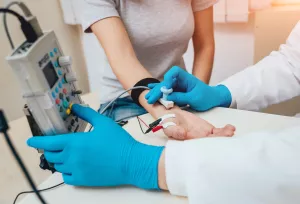An electromyogram (EMG) and nerve conduction survey (NCS) are a series of safe, minimally invasive tests that help us understand how your muscular and nervous systems work together. If you're living with a suspected neuromuscular condition, your doctor may order an EMG and NCS evaluation.
What do EMG and NCS stand for?
Nerves send electrical signals to muscles, telling them to contract when needed. When there's something wrong with muscles or nerves, normal electrical activities start to change.
To treat and diagnose certain neurological conditions, your doctor may prescribe a two-part electrodiagnostic study to study changes in your electrical activities:
- Electromyogram (EMG): A test that measures the electrical activity of muscles when they're resting and contracting.
- Nerve conduction survey (NCS): Measures how quickly and effectively your nerves can send electrical signals to your muscles.

Conditions
Your doctor may order an EMG and NCS evaluation if they suspect you have one of these conditions:
Testing
An EMG and NCS evaluation takes no longer than an hour to complete. The NCS test is usually performed first. The technologist will apply small electrical shocks to a certain area to see how your nerves react.
For the EMG, the technologist will insert a small needle into your muscles. The needle applies a pulse that helps us look for abnormalities. You may feel a slight tingling sensation or minor discomfort during the exam — this is completely normal.
The good news is that these tests are extremely helpful and a big leap forward in gaining answers about your condition and the actions we need to take for a healthier you.

From regular office visits to inpatient stays, find the healthcare you need and deserve close to home.

Meet the doctors and care team devoted to supporting you every step of the way along your path to better health.